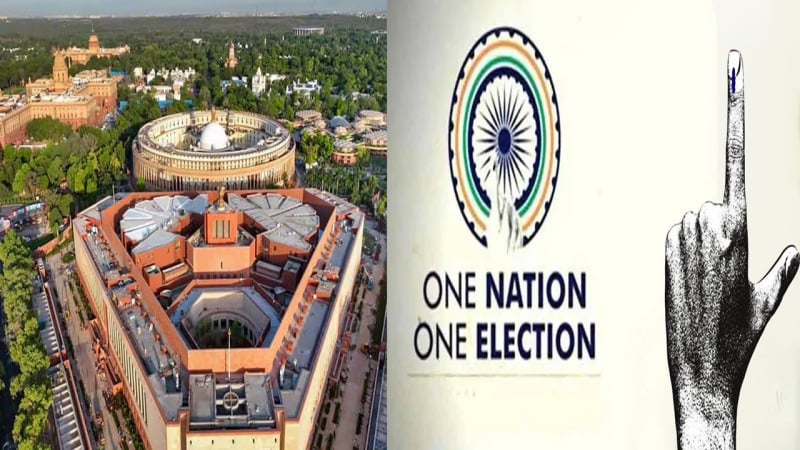
The Modi cabinet has approved the 'One Country One Election' proposal. But its real test is yet to come. It will still have to go through constitutional processes. It will be tested in Parliament, where it will require a two-thirds majority to be passed. At present, the government is saying that we will implement it in this term itself.
The Modi cabinet has approved the 'One Country One Election' proposal. A committee was formed for this. Former President Ram Nath Kovind was its chairman. The committee submitted its report to President Draupadi Murmu. Union Information and Broadcasting Minister Ashwini Vaishnav said that the cabinet has accepted the committee's report. The proposal has been approved but it is yet to be tested. It will still have to go through constitutional processes. A two-thirds majority is needed to pass it in Parliament. Not only this, not one or two but many amendments will be needed in the Constitution.
At present, the government is saying that we will implement it in this term itself. We will try to build a consensus. The recommendations of the committee will be discussed on various forums in the country. In the first phase of the new system, Lok Sabha and Vidhan Sabha elections will be held. In the second phase, local elections (panchayat and corporation) will be held. These elections will be held within 100 days of the first phase of elections. Anyway, these are the proposed matters. Now let us know which exams he will have to give. Also know what the ruling party and the opposition have to say about this.
Article 83 of the Constitution
- Article 83 of the Constitution mentions the term and functions of the Lok Sabha and the Rajya Sabha. This article is part of Chapter-II of Part-V of the Constitution. According to Article 83(1), the Lok Sabha shall function for five years from the date of its first meeting. However, the President has the power to dissolve it.
- The Lok Sabha can be dissolved before five years under the provisions of Article 83(2). This happens when the President feels that the government cannot function in accordance with the Constitution or when the ruling party loses its majority.
- Further, Article 83(3) also allows for the extension of the term of the Lok Sabha during a proclamation of emergency. The maximum extension that can be granted at a time is one year.
- Article 83(4) deals with the Rajya Sabha. It states that it cannot be dissolved. It is a permanent body. One-third of its members retire every two years. Thus, Article 83 of the Indian Constitution plays a role in relation to the tenure of both Houses of Parliament.
- Not just the 5 amendments in the Constitution, this proposal will also have to be tested in both the houses of the Parliament. It will require a two-third majority to be passed in the Lok Sabha and Rajya Sabha. Even after this, the path is not completely clear. For this, there needs to be unanimity in the state assemblies. Along with this, the Election Commission of the country will have to make many changes in the election process for One Nation One Election.
Article 85 of the Constitution
- Article 85 of the Indian Constitution gives the President the power to summon, adjourn and dissolve Parliament. It lays down the framework for the conduct of sessions of Parliament. Thus, this article provides three powers to the President.
- Article 172 provides for the tenure of state legislatures, Article 174 provides for the dissolution of state legislatures and Article 356 provides for the imposition of President's rule in states.
- To implement the 'One Nation One Election' system, these sections will also have to undergo the process of amendment.
What are the challenges facing the government?
The cabinet has approved the proposal. But, it still faces many challenges. The biggest challenge is the two-thirds majority. The government has said that except for 15 out of 47 parties, all others have supported it. The committee received more than 21 thousand responses. Before knowing what any political party has to say on this subject, let us take a look at the important recommendations of the Kovind Committee.
What did the Kovind Committee say?
- From 1951-52 to 1967, elections to the Lok Sabha and state assemblies were held simultaneously.
- The Law Commission of the country has said in its 170th report that the practice of holding elections every year and without any fixed time should be ended.
- We should again follow the previous process, in which Lok Sabha and all Assembly elections were held together.
- The Parliamentary Standing Committee had recommended holding simultaneous elections in two phases in its 79th report in 2015.
- Keeping all these things and facts in mind, it is necessary to hold simultaneous elections in the interest of the country.
Government's stand on 'One Nation One Election'
Union Home Minister Amit Shah called the 'One Nation One Election' proposal a big step after it got the cabinet's approval. He said that it reflects PM Modi's will to strengthen democracy and promote economic development. Under Modi's leadership, the country is witnessing transformative reforms.
Opposition's comment on 'One Country One Election'
- Congress is against this system. Party president Mallikarjun Kharge says that the people of the country will not accept this. BJP only diverts people's attention by making it an election issue. 'One Nation One Election' is not feasible.
- BSP supremo Mayawati is in support of this system. She has said that our party's stand on this is positive. But its objective should be in national interest.
- Akhilesh Yadav has not clarified whether he is in support or against it. He has raised some questions but has not written anywhere that he is against it.
- Like Congress, Aam Aadmi Party is also against it. A party MP has said that this is the slogan of Modi government. There is a conspiracy to postpone the Delhi assembly elections. Aam Aadmi Party will protest. BJP wants to carry out hooliganism.
 look news india
look news india
